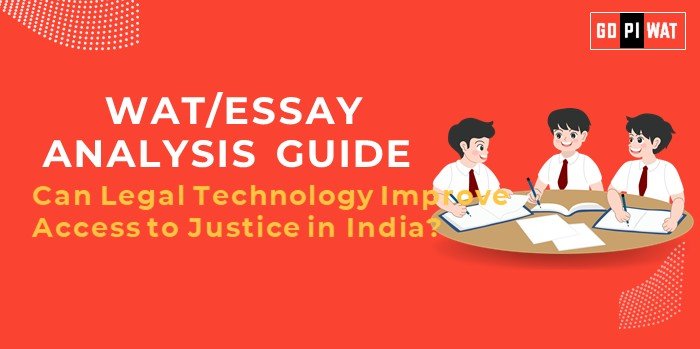📋 Written Ability Test (WAT)/Essay Analysis Guide: Can Legal Technology Improve Access to Justice in India?
🌐 Understanding the Topic’s Importance
Legal technology addresses critical social issues such as judicial delays and access gaps, resonating with B-school themes of innovation, inclusivity, and operational efficiency. Its potential to democratize justice delivery in India makes it a crucial area of discussion.
⏱️ Effective Planning and Writing
- Time Allocation:
- Planning: 5 minutes
- Writing: 20 minutes
- Review: 5 minutes
- Structure:
- Introduction: 60-70 words
- Body: 350-375 words
- Conclusion: 60-70 words
✍️ Introduction Techniques
- Contrast Approach: “India, home to over 1.4 billion people, struggles with over 40 million pending court cases, yet legal technology remains underutilized.”
- Solution-Based Approach: “Legal technology, with AI and blockchain, promises to solve India’s judicial backlog while ensuring greater transparency.”
📖 Structuring the Essay Body
🎯 Achievements:
- eCourts: Improved access to case tracking and digital filing systems.
- SUPACE (Supreme Court Portal for Assistance in Court Efficiency): An AI tool aiding judicial decision-making.
- Digital Legal Aid Apps: Increased outreach and cost savings for underserved populations.
⚠️ Challenges:
- Digital Divide: Limited access to internet and devices in rural areas.
- Cybersecurity: Risks of hacking and data breaches in online platforms.
- Resistance to Change: Hesitation among legal professionals to adopt technology.
🔮 Future Outlook:
- Integrated platforms for seamless case management and online dispute resolution.
- Enhanced broadband connectivity to ensure rural inclusivity.
- Robust cybersecurity frameworks to safeguard digital infrastructure.
📊 Analyzing Successes and Shortcomings
- Key Achievements: Efficient case tracking, cost savings, improved outreach through digital tools.
- Ongoing Challenges: Digital illiteracy, lack of rural penetration, and technological resistance.
- Global Context: Adoption of online courts in Estonia and ODR platforms in the UK showcases successful implementations.
📣 Recommendations for Sustainable Progress
- Expand broadband infrastructure in rural areas to bridge the digital divide.
- Introduce mandatory digital training programs for legal professionals and judiciary staff.
- Strengthen cybersecurity frameworks to ensure data protection and build public trust in digital platforms.
📝 Sample Short Essays
1. Balanced Perspective:
“Legal technology can bridge India’s justice gap, but addressing digital illiteracy and security concerns is crucial.”
2. Solution-Oriented:
“Integrating AI and blockchain into judicial systems could transform India’s legal landscape, reducing delays and increasing transparency.”
3. Global Comparison:
“By emulating Estonia’s online court model, India can significantly reduce its case backlog, ensuring timely justice for all.”


